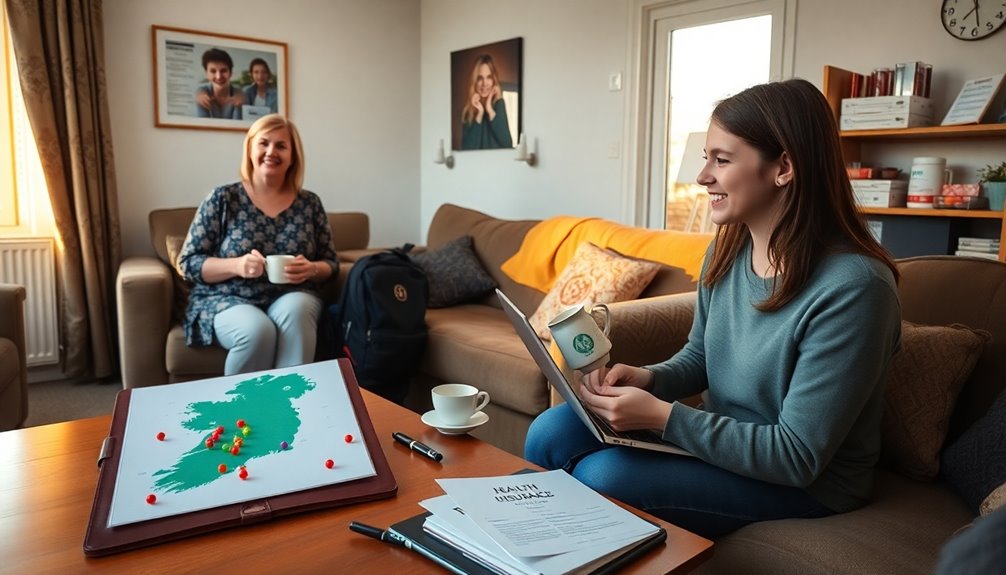
You’ll want clear goals and flexible program options that match learners’ levels and schedules, from intensive courses to part‑time classes and one‑to‑one tuition. Use local meetups and conversation cafés for low‑pressure practice, plus simple teaching tools like flashcards and daily prompts. Keep emergency contacts, nearby clinics and pharmacies, and checklists handy. Compare fees, meal plans and reviews carefully, verify host references, and set regular check‑ins — scroll on to find practical checklists, local groups and templates.
Choosing the Right Language Programs in Cork
Looking for the right language program in Cork starts with knowing what you want to achieve and how you learn best. You’ll weigh program types—intensive courses, part-time classes, one-to-one tuition, or immersion stays—against your daily life and appetite for adventure. Think about program durations: short boosts to sharpen speaking, month-long stays to build routines, or semester options that let you dive deeper while living with a host family. Pick formats that grant flexibility, so you can explore the city, meet locals, and practice freely. Check schedules, lesson focus, and student-to-teacher ratios to match your pace. Choose a program that supports independence while offering the structure you need to progress.
Local Language Exchange Meetups and Conversation Cafés
When you want low-pressure practice and real conversations, local language exchange meetups and conversation cafés are ideal: they pair learners and native speakers in relaxed settings so you can build fluency, pick up slang, and get immediate feedback without the formality of a classroom. You’ll find friendly language partners ready to chat about everyday life, hobbies, or local events, giving you flexible chances to experiment and make mistakes. These gatherings let you steer your learning, gain confidence, and enjoy genuine cultural immersion while staying independent.
Low-pressure language meetups pair learners with native speakers for casual conversation, confidence, and real cultural immersion.
- Go regularly to build rapport with language partners.
- Try theme nights to focus skills without pressure.
- Host or suggest meetups to shape conversations you want.
Resources for Cultural Orientation and Integration
You’ll want a concise local customs overview to know what’s polite and what’s not in day-to-day interactions. Check a community events calendar so you can join festivals, markets, and neighborhood gatherings that help you connect. Use practical integration tips—transport, registration, and household norms—to settle in smoothly with your host family.
Local Customs Overview
Because adapting to local customs makes everyday life smoother and more respectful, this section points you to practical resources—brief guides, etiquette tips, and community programs—that help language learners understand social norms in Cork and integrate more confidently into neighbourhood life. You’ll find focused info on Irish etiquette and Cork traditions, with clear notes on greetings, punctuality, modest dress, and when to join family gatherings. Look for short booklets, online videos, and host-family orientation packs that highlight local cuisine and cultural festivals so you can join in without feeling lost. Simple checklists make it easy to practice social norms while keeping your independence.
- Quick etiquette primers
- Food and festival primers
- Host-family conversation starters
Community Events Calendar
Having a few etiquette tips and festival basics under your belt makes it easier to get out and meet people at local events, so now let’s look at how a community events calendar keeps you plugged into Cork life. You’ll want a single, reliable calendar—online or printed—that lists weekly markets, music nights, talks, and charity initiatives so you can choose what fits your time and mood. Use it to plan low-pressure community engagement: drop-in arts sessions, language cafés, or park clean-ups. Prioritize events that welcome casual arrivals so you’re free to come and go. Tracking event participation helps you spot recurring opportunities and build ties at your own pace, without feeling obliged to follow a rigid schedule.
Practical Integration Tips
While settling into Cork, lean on a few targeted resources to speed up cultural orientation and make everyday life smoother. You’ll want quick guides, local mentors, and practical routines that let you explore without feeling tied down. Focus on cultural immersion that’s flexible and enjoyable, mixing solo outings with shared family activities to build bonds and confidence.
- Local meetup platforms — find language exchanges and informal walks to learn slang and spots.
- Volunteer or join clubs — contribute time, meet neighbors, and practice conversation naturally.
- Practical checklists — transport cards, shops, and emergency contacts so you and your guests move freely and safely.
These tips help you create an open, low-pressure home where language learners thrive.
Practical Tools for Hosting and Teaching at Home

You can build confidence quickly by using daily conversation prompts that fit your household routines. Keep a small set of simple teaching materials—flashcards, labeled objects, and short picture books—to reinforce new words. Rotate prompts and materials each week so practice stays focused and fresh.
Daily Conversation Prompts
Because everyday moments add up, short, focused conversation prompts can turn routine tasks into powerful language practice; pick a prompt for breakfast, a walking route, or chores and your guest will get steady, stress-free speaking time. You’ll want prompts that feel freeing, flexible, and tied to daily life: ask about cultural anecdotes, describe favorite books, or compare local foods. Keep it optional and low-pressure so your learner chooses how much to share.
- Morning: describe today’s plan, name one local sight you’d visit, or recall a cultural anecdote.
- Walk: narrate what you see, ask “what would you change?” or share a favorite books title and why.
- Chores: give simple instructions, tell a story, invite questions.
Simple Teaching Materials
A few versatile, low-cost materials can make home language practice consistent and fun without turning your living space into a classroom. You’ll want basic lesson plans, quick visual aids, and things that fit your relaxed rhythm. Use flashcards, a whiteboard, sticky notes, simple worksheets, and picture books. Rotate items so sessions stay fresh and short — learners like freedom, not routines that feel strict. Keep supplies accessible in a basket and invite learners to choose activities.
| Item | Purpose | How to use |
|---|---|---|
| Flashcards | Vocabulary recall | Timed drills, games |
| Whiteboard | Sentence practice | Write corrections together |
| Sticky notes | Labeling | Tag household items |
| Picture books | Context | Read, ask questions |
| Worksheets | Focused skills | 10–15 minute tasks |
Emergency, Health, and Student Support Services

When emergencies or health issues arise, you’ll have clear, immediate contacts and straightforward procedures to follow so students get prompt care and support. You should know local emergency numbers, nearby clinics, and how the school or agency handles health emergencies. Build strong support networks with hosts, coordinators, and nearby families so students don’t feel isolated. Keep consent forms, medical info, and quick-translation apps accessible.
Have clear emergency contacts, local clinic info, and support networks so students receive prompt, organized care.
- Provide one-page emergency cards with contacts, allergies, and insurance details.
- Establish regular check-ins and an on-call coordinator for non-urgent concerns.
- Map nearest pharmacies, GP clinics, and 24-hour hospitals and share routes.
These steps preserve student freedom while ensuring safety and quick, organized responses when issues occur.
Assessing Costs, Reviews, and Quality Indicators
Good emergency plans and clear support systems also make it easier to evaluate value and quality—if students feel safe, you can focus on costs, reviews, and indicators that really matter. When you assess host options, use a structured cost evaluation: list fees, meal plans, transport, and hidden charges, then compare total weekly and monthly costs. Check independent reviews on forums and language-school sites, looking for patterns rather than single opinions. For quality assessment, prioritize consistent host communication, punctuality, and student feedback on language practice opportunities. You’ll want evidence of verified references and clear cancellation policies. Balance affordability with proven quality; cheaper isn’t always freer if it limits student experience. Trust measurable indicators and your own priorities.
Some Questions Answered
Can Host Families Receive Tax Deductions for Hosting Language Students?
Yes — you might score surprising tax benefits if you report student payments properly, but don’t expect magic; you’ll need records, justify income versus expenses, and maybe consult an accountant so you keep freedom and avoid tax headaches.
How Should Hosts Handle Dietary Restrictions and Severe Food Allergies?
You’ll discuss dietary communication upfront, ask about ingredients and reactions, enforce strict allergy awareness in meal prep, label foods, keep emergency meds accessible, and empower guests to cook or choose alternatives so everyone keeps freedom and safety intact.
Are There Minimum Age Requirements for Students Staying With Host Families?
Yes — you’ll usually see age limitations: programs set minimum student age (often 16) and may have upper or lower student age rules depending on placements. You’ll want to check each program’s specific student age limits.
Can Hosts Request a Criminal Background Check on Incoming Students?
About 72% of hosts say they’d feel safer requesting checks, and yes, you can usually ask for background check policies, but you’ll need to balance student privacy concerns and freedom, handling requests transparently and consensually.
What Insurance Covers Host Family Liability for Hosted Students?
You’ll need host family insurance with liability coverage—typically a home insurance add-on or specific homestay policy that covers injuries, property damage, and legal costs related to hosted students, giving you protection and freedom to welcome guests confidently.
